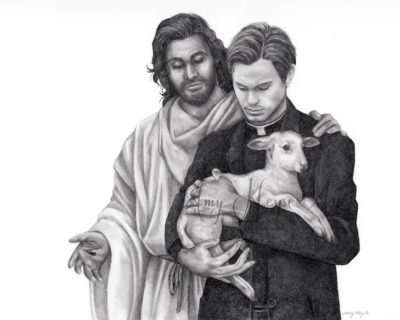Fourth Sunday of Easter
May 8, 2022 — Year C
Readings: Acts 13:14, 43-52 / Ps 100 / Rev 7:9, 14b-17 / Jn 10:27-30
by Rev. Nixon Negparanon, Pastor
Four clergymen, taking a short break from their heavy schedules, were on a park bench chatting and enjoying an early Spring day.
“You know, since all of us are such good friends,” said one, “this might be a good time to discuss personal problems.” They all agreed.
“Well, I would like to share with you the fact that I drink to excess,” said one. There was a gasp from the other three.
Then another spoke up. “Since you were so honest, I’d like to say that my big problem is gambling. It’s terrible, I know, but I can’t quit. I’ve even been tempted to take money from the collection plate.” Another gasp was heard.
The third clergyman spoke. “I’m really troubled, brothers, because I’m growing fond of a woman in my church, a married woman.” More gasps.
But the fourth remained silent. After a few minutes, the others coaxed him to open up. “The fact is that I just don’t know how to tell you about my problem.”
“It’s all right, brother, your secret is safe with us,” said the others.
“Well, it’s this way,” he said, “You see, I’m an incurable gossip.”
Brothers and Sisters, jokes like this have shaped our view of priests, as if there is no difference between the life and work of a priest and that of other Christians. That is true only up to a point. We see another dimension to the life and work of priests when we consider it from the aspect of vocations, or the Call of God. This is the aspect that the Church wants us to dwell on today, as we observe the World Day of Prayer for Vocations. Today the Church invites us to reflect on the meaning of God’s call, and to pray for an increase in vocations.
To help us reflect on the meaning of the priestly vocation, let us not only pray for religious vocations, but also encourage and support young men and women who have the inclination to walk the less-travelled road. If you feel you are called, or have the desire, to serve God and His people in a more meaningful way, and without having a family, a wife or children, then you are called to become a priest and to grab that opportunity given by God. You should inquire further and discern God’s will. You can consult me or some other priest regarding your desire, or call our Vocation Director.
One way of showing our love for God, especially for parents, is by supporting and encouraging our children to enter the priesthood. The family is the seedbed of vocations; a fertile ground for more vocations. Parents can demonstrate their faith in the way they encourage their children.
In last Sunday’s gospel, we heard Jesus three times give Peter the charge to “feed my sheep.” In that way, He made Peter a shepherd, a pastor, a priest. In today’s gospel, the Church presents to us the figure of Jesus, the Good Shepherd. Our Lord continues His work of shepherding His people through Peter and his co-workers, the apostles and the disciples, and through their successors, the Pope, the bishops, priests, deacons, catechists, laypeople, and others.
Today is also known as Good Shepherd Sunday. In today’s gospel, Jesus tells us what a good shepherd is. A good shepherd is present, knows, directs, tends, and protects the sheep.
We who are in involved in shepherding others in one way or another, would do well to ask ourselves today if we are good or bad shepherds or shepherdesses, in the light of today’s gospel.
First of all, a shepherd must be present to the sheep. How can the sheep hear someone who is absent, or is not accessible, or is hard to reach? We can say anything we want, or put up numerous excuses and reasons, but being present and being with the sheep are very basic and important.
Second, a good shepherd knows the sheep, or at least takes time and gives effort to get to know the sheep. We want shepherds who are genuinely interested and who genuinely care. A text message says it beautifully: People don’t care about what you know, as long as they know you care.
Third, a good shepherd leads and directs the sheep. He or she must have an idea, a direction, of where to lead the sheep. The good shepherd or shepherdess must have a clear vision and a strong sense of mission for the sheep.
Fourth, a good shepherd gives. He or she must have a sense of sacrifice. We need shepherds and shepherdesses who can also give us our sense of dignity, freedom, respect, and personhood.
Finally, a good shepherd protects the sheep. He or she must be aware and must protect us from all that would harm us. When push comes to shove, he or she must be ready to sacrifice life and limb for the good of the sheep.
So, Brothers and Sisters, on Good Shepherd Sunday, let us pray for more good shepherds of the church. Let us also pray for a better understanding and appreciation of the life and work of ordained ministers, so that more and more people avail themselves of the grace which God makes available through them. Let us also pray that more young people will be drawn to follow in their footsteps and generously answer the call of God.
 540-586-8988
540-586-8988 

